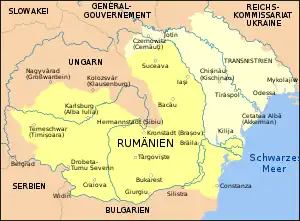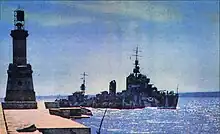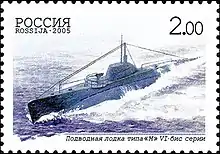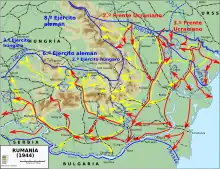Naval operations in Romanian-occupied Soviet waters
Between 1941 and 1944, Romania held control over much of the Ukrainian Black Sea coast East of the Crimea. This was acquired during Operation Barbarossa. The Romanian conquest of the Soviet Western Black Sea coast started in July 1941 during Operation München and ended in October that year, after the Siege of Odessa. In the aftermath of these actions, Romania (re)acquired two new sectors of coastline: the Bessarabian coast (which was controlled by Romania prior to the Soviet occupation of Bessarabia and Northern Bukovina) and the Transnistrian Coast. The latter was lost in April 1944, but the former was successfully defended until August 1944.
| Naval operations in Romanian-occupied Soviet waters | |||||||
|---|---|---|---|---|---|---|---|
| Part of the Black Sea campaigns (1941-1944) | |||||||
 Territories (re)acquired by Romania during Operation Barbarossa | |||||||
| |||||||
| Belligerents | |||||||
|
|
| ||||||
| Commanders and leaders | |||||||
|
|
| ||||||
| Strength | |||||||
|
Military vessels: 3 destroyers 5 gunboats 2 minelayers 2 motor torpedo boats |
Military vessels: 6 submarines 2 motor gunboats | ||||||
| Casualties and losses | |||||||
|
Military vessels: 2 motor torpedo boats |
Military vessels: 4 submarines sunk 2 submarines damaged 2 motor gunboats sunk | ||||||
Actions in Bessarabian waters
On 17 December 1941, the Soviet M-class submarine M-59 carried out an attack against an Axis convoy near the coastal town of Jibrieni in December 1941. The convoy consisted of the Hungarian cargo ships Kassa and Kolozsvár[1] and the Bulgarian cargo ship Tzar Ferdinand.[2] The three ships were escorted by the Romanian destroyers Regele Ferdinand and Regina Maria, the Romanian gunboats Stihi and Ghiculescu and the Romanian torpedo boats Sborul and Smeul. The two torpedoes launched by the Soviet submarine missed the aft and bow respectively of the Romanian destroyer by about 30 feet each. With 25 knots, Regele Ferdinand rushed to the place the torpedoes were launched from and dropped three series of depth charges. Between the second and third series, fuel and bubbles emerged from the water. Regele Ferdinand subsequently circled the area and dropped four more depth charges, followed by more fuel emerging from the depths as well as pieces of wood. Regele Ferdinand reported the sinking of the submarine, which was confirmed by the Romanian Naval Command. Post-war sources revealed the identity of the submarine as M-59.[3][4][5][6]
On 1 October 1942, near the Burnas Lagoon, the Soviet M-class submarine M-118 attacked and sank the German transport ship Salzburg. After attacking, the submarine was located by a German BV 138C flying boat, and the Romanian gunboats Sublocotenent Ghiculescu and Stihi Eugen were sent to the scene. The two Romanian warships attacked the submarine with depth charges, sinking her with all hands.[7][8][9]
On 14 October 1942, the Soviet submarine M-32 unsuccessfully attacked the Romanian destroyer Regele Ferdinand near the Burnas Lagoon, the submarine being subsequently depth charged and damaged by the Romanian torpedo boat Smeul.[10][11]
Actions in Transnistrian waters
On 9 November 1941, the Romanian motor torpedo boats Viforul and Vijelia were sunk near Odessa by Soviet mines.[12]
On 13 June 1942, the Soviet submarine A-5 was damaged by Romanian depth charges near Odessa.[13]
On 24 June 1942, the Romanian minelayer Amiral Murgescu along with one auxiliary minelayer laid mines off Odessa, while being escorted by the Romanian destroyers Regele Ferdinand and Regina Maria, the Romanian flotilla leader Mărășești, the Romanian gunboats Ghiculescu, Stihi and Dumitrescu and the Romanian gunboat Smeul (ex-torpedo boat), as well as German motor minesweepers of the Donau Flotilla.[14] The mines laid near Odessa later sank the M-class submarines M-33 and M-60 on 24 August and 26 September that year.[15][16]
Also sunk by the Romanian-laid mines near Odessa were the motor gunboats YA-26 and YA-27 on 18 April 1944,[17] a few days after Transnistria was re-occupied by Soviet forces.
Gallery
.jpg.webp) The Romanian minelayer Amiral Murgescu
The Romanian minelayer Amiral Murgescu The Romanian destroyer Regele Ferdinand
The Romanian destroyer Regele Ferdinand Soviet M-class submarine
Soviet M-class submarine The Romanian front in August 1944
The Romanian front in August 1944
References
- Antony Preston, Warship 2001-2002, pp. 77
- Antony Preston, Warship 2001-2002, pp. 80
- Nicolae Koslinski, Raymond Stănescu, Marina română in al doilea război mondial: 1941-1942, Făt-Frumos, 1996, pp. 274-275
- Jipa Rotaru, Ioan Damaschin, Glorie și dramă: Marina Regală Română, 1940-1945, p. 67 (in Romanian)
- Donald A Bertke, Gordon Smith, Don Kindell, World War II Sea War, Volume 5: Air Raid Pearl Harbor. This Is Not a Drill, p. 63
- Paul E. Fontenoy, Submarines: an illustrated history of their impact, ABC-CLIO, 31 March 2017, p. 275
- Antony Preston, Warship 2001-2002, pp. 79-80
- Donald A Bertke, Gordon Smith, Don Kindell, World War II Sea War, Volume 7: The Allies Strike Back p. 179
- Mikhail Monakov, Jurgen Rohwer, Stalin's Ocean-going Fleet: Soviet Naval Strategy and Shipbuilding Programs 1935-1953, p. 266
- Donald A Bertke, Gordon Smith, Don Kindell, World War II Sea War, Volume 7: The Allies Strike Back, p. 179
- Antony Preston, Warship 2001-2002, pp. 79-80
- Donald A Bertke, Gordon Smith, Don Kindell, World War II Sea War, Volume 4: Germany Sends Russia to the Allies, p. 390
- Donald A Bertke, Gordon Smith, Don Kindell, World War II Sea War, Vol 6: The Allies Halt the Axis Advance, Bertke Publications, 2014, p. 267
- Donald A. Bertke, Gordon Smith, Don Kindell World War II Sea War, Volume 6: The Allies Halt the Axis Advance, p. 268
- Mikhail Monakov, Jurgen Rohwer, Stalin's Ocean-going Fleet: Soviet Naval Strategy and Shipbuilding Programs 1935–1953, Routledge Publishing, 2012, p. 266
- Donald A. Bertke, Gordon Smith, Don Kindell World War II Sea War, Volume 6: The Allies Halt the Axis Advance, Bertke Publications, 2014, p. 268
- Nicolae Koslinski, Raymond Stănescu, Marina română in al doilea război mondial: 1944–1945, p. 365 (in Romanian)